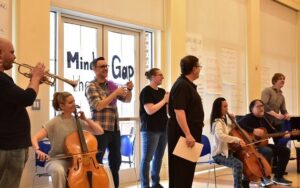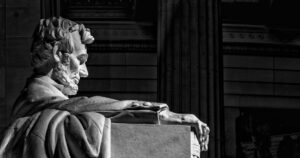By Harry C. Boyte, St. Paul Pioneer Press
A week before last month’s presidential debates, when politicians’ rhetoric threatened deepening polarization, a movement to depolarize America called “Braver Angels” held its second annual convention. Equal numbers of Republican and Democratic delegates participated, 130 from each side and from every state, June 20 to 23 in St. Louis.
Participants included Hawk Newsome, president of New York’s Black Lives Matter, and Ray Warrick, a leader of the Tea Party in Cincinnati. “I’ve never been a part of anything where you don’t really have to recruit people,” co-founder David Blankenhorn told reporter Megan Mertz, writing for The Federalist. “People want to be involved.”
Blankenhorn, founder of the Institute for American Values, had long worried about deepening polarization in the country. After the election in 2016, he joined with David Lapp, a colleague in Ohio, to organize meetings between Trump and Clinton supporters to see if any common ground could be found. They called William Doherty, director of the Marriage and Family Therapy Program at the University of Minnesota.
Doherty drew on his experiences in family therapy to plan the meeting process, designed to allow participants to “bring their best selves forward, listen to the other person and not just immediately get into an argument, and reflect on their contribution to the problem.”
All the participants – 10 Trump supporters and 11 Clinton backers — agreed to a statement that read, “A number of us on both sides began our meetings convinced that the other side could not be dealt with … We say unanimously that our experiences of talking with rather than at or about each other caused us to abandon our belief.”
After a broadcast on National Public Radio with Doherty and two women participants, one “Red” and one “Blue,” communities across the country wrote in to ask for similar meetings. Out of these early efforts Braver Angels was born, named for Abraham Lincoln’s phrase, “The Braver Angels of Our Nature,” calling Americans on the verge of Civil War to remember that “we are not enemies but friends.”
The organization has grown rapidly with more than 7,000 members. It is now active in 35 states, with Minnesota a leader. Their program of workshops, skills-building sessions and other activities is designed not to change opinions, but to allow people bitterly divided along partisan lines to listen to each other and break down stereotypes.
The convention in St. Louis adopted new initiatives with the media to challenge polarizing approaches, allow local alliances to take policy stands when there is Red/Blue agreement, and partner with kindred organizations.
A mission is also emerging complementing depolarization: The idea that “the people” need to take up the largest challenges facing the nation. Media director John Wood, a young man of mixed racial background and an eloquent spokesman for Braver Angels philosophy, described this aim in a mailing: “To weave and re-weave the social fabric of this nation, even as our politics threaten to tear it apart.”
The platform, passed by an overwhelming majority, declared the intention “to dedicate ourselves to the great task before us – to safeguard the spirit of our republic.” Invoking “We the People,” it elaborated, as goals, seeking “to renew our trust in one another and build our civic muscle” and striving “for the ‘beloved community’ of Dr. Martin Luther King … and the ‘more perfect Union’ of the Founders.”
The United States was, indeed, founded as a “constitutional republic” with three branches of government. Braver Angels points to another dimension with the phrase, “We the People.”
Unlike governments handed down from antiquity, the Preamble to the Constitution begins with “We the People,” a different authorship of government than kings or revolutionary vanguards. We the People continued to generate wellsprings of civic power and energy throughout American history, based on work by the people on common challenges across differences. This citizenship is far more than a trip to the ballot box.
“We the People,” in the Preamble, described the people’s aims in the active language of such work: “Form”; “establish”; “provide for”; “promote”; “secure”; and “ordain and establish.” In a debate in Virginia about the Constitution, James Madison defended such language against critics who preferred “We the States.” “The existing system has been derived from the … authority of the legislatures of the states; whereas, this (Constitution) is derived from the superior power of the people.”
As the late political theorist Sheldon Wolin observed, “Americans … introduced an entirely new conception of democracy as rooted in, and corresponding to, the democracy of daily life.”
Such a concept of democracy, in which politicians play important roles but common people’s work is at the center, was embodied in everyday experience. Reflecting on his travels in the 1830s, the French observer Alexis de Tocqueville compared European nations, where citizens relied on great leaders, with self-organizing citizen efforts in America. “In democratic peoples, associations must take the place of the powerful particular persons,” he wrote in “Democracy in America.” “In democratic countries the science of association is the mother science; the progress of all the others depends on the progress of that one.”
I saw real progress in the “science of association” in the constructive nonviolent politics of the civil rights movement as a young man. Martin Luther King, in his “Letter from a Birmingham Jail” in 1963, described the movement’s approach as “bringing our nation back to those great wells of democracy which were dug deep by the founding fathers in their formulation of the Constitution and the Declaration of Independence.”
When Dorothy Cotton, my boss in the movement’s citizenship schools, helped us to launch civic engagement through the Humphrey School at the UMN in the late 1980s, she expressed constructive nonviolence in a song, “We are the ones we’ve been waiting for. Nobody else is going to rescue us.”
I asked Bill Doherty about parallels between such historical experiences and Braver Angels. He saw many. “Leaders in Braver Angels (half red, half blue), though daunted by the polarized state of the Union, are the most hopeful group I’ve ever been around,” he said. “They are not waiting for national leaders to change — they are the change they want to see.”
What I would call the constructive nonviolent politics of Braver Angels needs to spread to other great challenges we face, such as climate change and growing inequality. This is the key to re-awakening democracy and creating a sustainable future.
Harry Boyte, senior scholar in Public Work Philosophy at Augsburg University, is the author of “Awakening Democracy through Public Work.”



